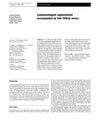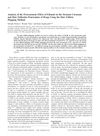9 citations,
January 2014 in “World journal of clinical cases” Neomycin is a common cause of follicular contact dermatitis, which is treated by avoiding the allergen and using creams.
[object Object]  March 2020 in “Central European Journal of Biology”
March 2020 in “Central European Journal of Biology” The study found that stem cells and neutrophils are important for regenerating hair follicle structures in mice.
 2 citations,
January 2008 in “Elsevier eBooks”
2 citations,
January 2008 in “Elsevier eBooks” Humans have limited regenerative abilities, but new evidence shows the adult brain and heart can regenerate, and future treatments may improve this by mimicking stem cell environments.
 77 citations,
March 2001 in “Clinics in Dermatology”
77 citations,
March 2001 in “Clinics in Dermatology” Androgenetic alopecia involves genetics, hormones, and can be treated with medications or surgery.
1 citations,
November 2022 in “Indian Journal of Dermatology/Indian journal of dermatology” Dermoscopy helps accurately diagnose and treat benign skin cysts.
 174 citations,
November 2002 in “Expert Reviews in Molecular Medicine”
174 citations,
November 2002 in “Expert Reviews in Molecular Medicine” Hair loss needs more research for better treatments.
 179 citations,
September 1998 in “BMJ”
179 citations,
September 1998 in “BMJ” Hair loss in men is common, treatable, but not curable.
 3 citations,
June 2013 in “Genes & development”
3 citations,
June 2013 in “Genes & development” CaV1.2 helps activate hair follicle stem cells without calcium flux.
 18 citations,
July 2022 in “Chemistry - an Asian journal”
18 citations,
July 2022 in “Chemistry - an Asian journal” Scientists created a 3D printed skin that includes hair and layers similar to real skin using a special gel.
 December 2023 in “Journal of comparative pathology”
December 2023 in “Journal of comparative pathology” A dog had a rare skin cyst, known as a dilated pore of Winer, surgically removed from its neck.
5 citations,
January 1999 in “Journal of dermatological treatment” Bioré Pore Perfect strips effectively and safely clean pores on the nose.
44 citations,
January 1999 in “Dermatology” Nevus comedonicus is a rare skin condition with grouped open pores, sometimes linked to other body issues.
1 citations,
January 2022 in “Clinical dermatology review” A young man's cheek papule was identified as a benign hair follicle tumor using a skin surface microscope.
[object Object]  November 2017 in “International journal of family & community medicine”
November 2017 in “International journal of family & community medicine” A man's low testosterone and related symptoms improved after he stopped taking hair loss drugs.
 1 citations,
January 2021 in “Nihon rinsho hifukaikai zasshi”
1 citations,
January 2021 in “Nihon rinsho hifukaikai zasshi” The document provides ways to tell alopecia areata from other similar hair loss conditions, using visual checks and specific tests.
 3 citations,
January 2016 in “Skin appendage disorders”
3 citations,
January 2016 in “Skin appendage disorders” Possible causes of female hair loss include androgenetic alopecia, telogen effluvium, cicatricial alopecia, and alopecia areata incognita; diagnosis and treatment require dermoscopy and histopathology.
January 2022 in “Clinical Cases in Dermatology” A man developed a unique rash on his neck after taking niacinamide, and doctors recommend considering niacinamide as a cause for similar rashes and using dermatoscopy for diagnosis.
 11 citations,
May 1998 in “Child's nervous system”
11 citations,
May 1998 in “Child's nervous system” A baby had a rare condition with abnormal blood vessels in the brain and unusual skin and hair growth, possibly a new syndrome.
 10 citations,
January 2014 in “Chemical and Pharmaceutical Bulletin”
10 citations,
January 2014 in “Chemical and Pharmaceutical Bulletin” Ethanol pretreatment affects drug penetration through skin and hair follicles.
 7 citations,
March 2012 in “Journal of Investigative Dermatology”
7 citations,
March 2012 in “Journal of Investigative Dermatology” Some thymic peptides can increase human hair growth, while others may inhibit it.
 5 citations,
December 2020 in “Experimental dermatology”
5 citations,
December 2020 in “Experimental dermatology” A specific type of skin cell creates an opening for hair to grow out, and problems with this process can lead to skin conditions.
 4 citations,
March 2019 in “Experimental Biology and Medicine”
4 citations,
March 2019 in “Experimental Biology and Medicine” Exposure to 50 Hz electromagnetic fields may help mice grow hair faster.
 277 citations,
June 2003 in “The journal of investigative dermatology. Symposium proceedings/The Journal of investigative dermatology symposium proceedings”
277 citations,
June 2003 in “The journal of investigative dermatology. Symposium proceedings/The Journal of investigative dermatology symposium proceedings” Epithelial-mesenchymal interactions control hair growth cycles through specific molecular signals.
 256 citations,
October 2013 in “Proceedings of the National Academy of Sciences of the United States of America”
256 citations,
October 2013 in “Proceedings of the National Academy of Sciences of the United States of America” Growing human skin cells in a 3D environment can stimulate new hair growth.
 179 citations,
April 2012 in “Nature Communications”
179 citations,
April 2012 in “Nature Communications” Regenerated fully functional hair follicles using stem cells, with potential for hair regrowth therapy.
 98 citations,
December 2003 in “The FASEB Journal”
98 citations,
December 2003 in “The FASEB Journal” Thymosin β4 promotes hair growth by activating stem cells in hair follicles.
 96 citations,
October 2000 in “The FASEB Journal”
96 citations,
October 2000 in “The FASEB Journal” The p75 neurotrophin receptor is important for hair follicle regression by controlling cell death.
 95 citations,
May 2012 in “British Journal of Dermatology”
95 citations,
May 2012 in “British Journal of Dermatology” Androgens block hair growth by disrupting cell signals; targeting GSK-3 may help treat hair loss.
 82 citations,
May 2009 in “Development”
82 citations,
May 2009 in “Development” EGF and KGF signalling prevent hair follicle formation and promote skin cell development in mice.
 78 citations,
October 2012 in “Biomaterials”
78 citations,
October 2012 in “Biomaterials” Larger spheroids improve hair growth, but size doesn't guarantee thicker hair.























